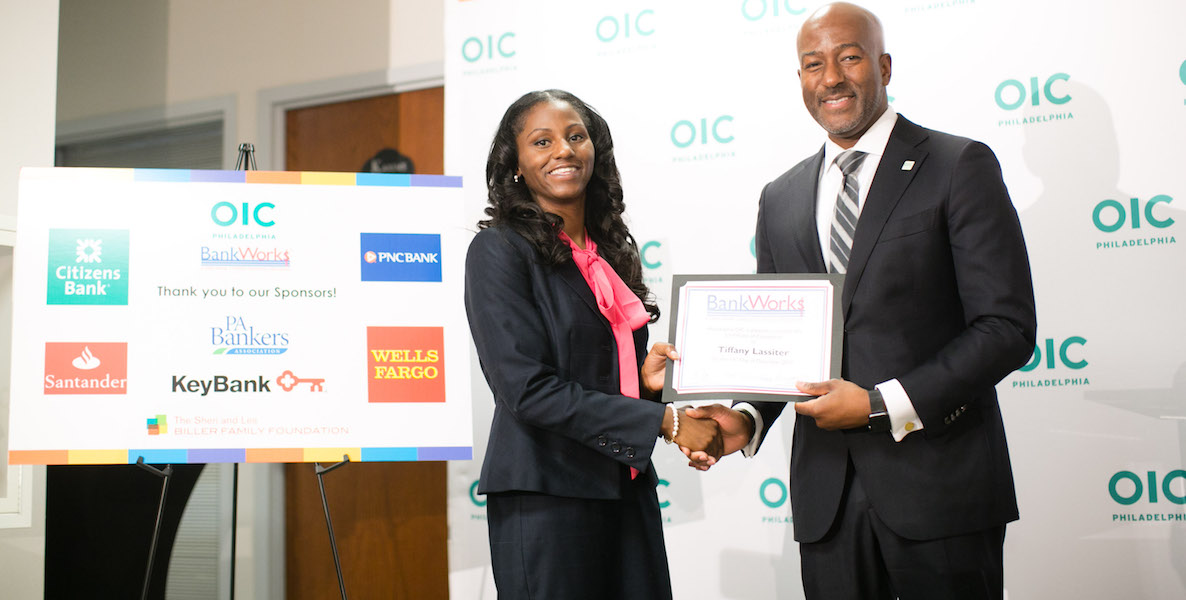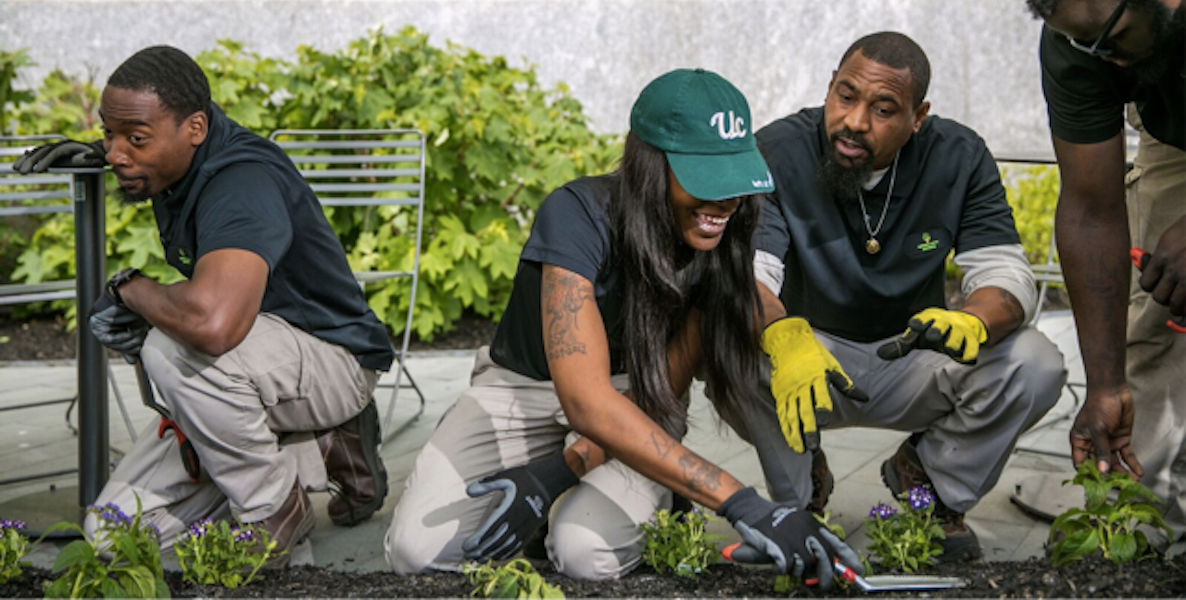In 2015, Xia Frazier was 27, bouncing from a job at a fast food restaurant to a position as a cashier at Target to, finally, unemployment. An unskilled West Philadelphia resident, she was struggling to support herself and her two-year-old son on minimum wage or less.
While scrolling through social media on her phone, she came across an ad for a program that would dramatically alter her financial situation and, ultimately, her view of herself and her abilities: a landscaping course run by the West Philadelphia Skills Initiative that, if she met the requirements of the program, would guarantee her a job with Green City Works (GCW), a social venture landscaping nonprofit.
In March 2016, Frazier became one of the now 14 skilled employees of Green City Works, created and run by the University City District in West Philadelphia. She has since been promoted to supervise GCW’s contract at CHOP Roberts Center.
“Before I came here, I was scrambling to figure out where I was going to get money from to take care of my son,” Frazier says. “They offered me a full-time job, benefits, and a nice pay rate. I’m finally comfortable.”
Green City Works is a competitive design, build, and maintenance company just like any other. They created the Rain Garden at the University of the Sciences; maintain all plants at 30th Street Station—including those in the outdoor “Porch” space; and conduct stormwater infrastructure for the city at large. They have 35 clients in all; 90 percent of their work is done for external clients, while 10 percent is completed in-house for UCD.
“When you take talented people and provide them with good quality jobs, supports, and training and advancement opportunities, they are amazing,” says English. “That has been our philosophy and it has fueled the growth of this company.”
The company’s goal, though, is quite different from that of most landscaping companies. “The bottom line is jobs created, not necessarily profit,” says GCW Director Brian English.
Green City Works specifically recruits and hires those with barriers to employment. According to Alissa Weiss, Director of Strategic Initiatives and Communications for UCD, “We’re focused on removing barriers from people’s past that made it hard for them to thrive in their career, regardless of what those barriers may have been.”
This includes applicants with criminal records. One in six Philadelphians are formerly incarcerated, and an estimated 92 percent of employers run criminal background checks on employees before hiring. This helps explain why 60 percent of all formerly incarcerated individuals are still unemployed a year after being released, and further contributes to recidivism, with 60 percent of formerly incarcerated Philadelphians returning to prison within three years.
![]() Several GCW crew members have criminal records, but English intentionally does not ask about this during interviews, preferring to focus on the applicant’s work in the classroom and in the field. GCW also works with those with barriers such as a sparse resume, or, as English calls it, a “self-imposed” barrier like lack of confidence. “We have people who don’t know how to tell their own stories, how to sell themselves and their histories,” he says.
Several GCW crew members have criminal records, but English intentionally does not ask about this during interviews, preferring to focus on the applicant’s work in the classroom and in the field. GCW also works with those with barriers such as a sparse resume, or, as English calls it, a “self-imposed” barrier like lack of confidence. “We have people who don’t know how to tell their own stories, how to sell themselves and their histories,” he says.
GCW offers full-time, year-round work to all of its employees, something that is hard to come by in the landscaping business, where many employees are laid off in the winter. With careful planning, GCW is able to ensure that it is profitable enough in the summer months to sustain employment through the down time of the winter. In that time, employees stay busy with snow removal and 80 hours of professional development, which covers everything from emotional intelligence to pest management. Employees are paid hourly to allow them to benefit from overtime pay, and start at $13 an hour. Every employee is given a raise after their first season.
“With most for-profits, if it rains, you don’t get paid for the day,” English says. “Your typical employer is thinking ‘Every minute that the employee is idle, I’m losing money out of my pocket.’ We wanted a 40-hour-work week for 12 months of the year.”
University City District launched Green City Works in 2016 to address gaps in their programming that had left many West Philadelphia residents unable to take advantage of the support they offered. The organization had been matching residents with employers seeking talent through the West Philadelphia Skills Initiative (WSPI) since 2011, when they noticed that the economic explosion linked with the universities in West Philadelphia was not reaching the doorsteps of the area’s unemployed. “As the neighborhood changed, there were more and more jobs,” says Weiss. “There were 80,000 jobs available, and 81,000 people living in poverty. We really wanted to bridge that gap.”
At the same time, English, a Philadelphia native, was managing a New York City landscaping company but was looking to return to his hometown for good. He was intimately aware of the volatility of working in the landscaping industry and was, like UCD, looking for an opportunity to push a new model. “The day before I saw this position advertised I had a conversation with my wife about starting a company in Philly that could combine my background in landscaping and construction with a meaningful social and environmental impact,” he says. “It was just a matter of good timing that I found this position and saw that UCD was already pointed in this direction.”
![]() With English’s help, Green City Works became a way to address UCD’s lack of opportunities for many West Philly residents and to wed the organization’s job training expertise with its other core area of work: neighborhood beautification. “We began to say: ‘Is there a way that we can wed these things?’” Weiss says. “We had been outsourcing our own landscaping needs. We thought, wait, can we do this and use our own expertise in job training to do so?”
With English’s help, Green City Works became a way to address UCD’s lack of opportunities for many West Philly residents and to wed the organization’s job training expertise with its other core area of work: neighborhood beautification. “We began to say: ‘Is there a way that we can wed these things?’” Weiss says. “We had been outsourcing our own landscaping needs. We thought, wait, can we do this and use our own expertise in job training to do so?”
Before they’re hired, Green City Works employees must first participate in the West Philadelphia Skills Initiative, a program of flexible length in which UCD pairs with an employer to provide soft skills and technical training for that particular partner. In the case of GCW, the program runs anywhere from 5 to 13 weeks, depending on how much formal training the participants need, and includes everything from reading landscaping maps to visiting nurseries, in addition to soft skills classes. While English speaks to the landscaping cohorts and, toward the end of the program, works with participants on site, the classes are primarily led by WPSI staff.
Despite GCW’s unwavering commitment to its employees, English insists that his workers are well trained and that the company is a highly competitive one. “If Green City Works folded tomorrow, we’d have 14 highly employable people,” he says. “This is not charity; this is a business.”
“If Green City Works folded tomorrow, we’d have 14 highly employable people,” English says. “This is not charity; this is a business.”
As a full-scale business, GCW must compete with the plentiful landscaping companies in the city; though English says there’s plenty of work to go around, he also believes that GCW has managed to stand out in West Philly. “The number one thing for clients is quality. We have unique approaches for solving problems and creating spaces,” he says. “Our clients keep coming back for more and more. They wouldn’t keep doing that if the services they were getting weren’t at a certain level.”
Dan Severino, Director of Facilities Services at University of the Sciences, hired GCW to design and create the university’s Rain Garden in 2016, and has been coming back for more ever since. He and the rest of the staff are attracted to GCW for multiple reasons, but first and foremost is GCW’s commitment to the West Philadelphia community, and the opportunity it provides USciences to contribute as well.
“It’s our way of giving back to the community. The last couple of years the university has tried to be more open to the community and bring them in,” he explains. “It’s the sense of pride the employees get from working on our campus. They come back and walk around with their families and say, ‘Look, I helped build this.’”
But Severino continues to work with GCW simply because they do a great job. “The Rain Garden was the first test for them and us,” he says. “The project was so big and the program was so new. And they knocked it out of the park.”
![]() USciences took on GCW again in the spring and summer of 2017 to renovate the D’Angelo Mall, what many call the “heart” of the university’s campus, where they planted over 12,000 bulbs and trees. The project led to the creation of four additional full-time positions at GCW, and Severino hopes to continue this trend; the university currently has a “mini-master plan” for landscape, which contains several projects that they plan to complete with the help of GCW.
USciences took on GCW again in the spring and summer of 2017 to renovate the D’Angelo Mall, what many call the “heart” of the university’s campus, where they planted over 12,000 bulbs and trees. The project led to the creation of four additional full-time positions at GCW, and Severino hopes to continue this trend; the university currently has a “mini-master plan” for landscape, which contains several projects that they plan to complete with the help of GCW.
While Green City Works is technically a nonprofit, the drive behind the work is always how to bring in as much revenue as possible so as to offer high wages and to continue to grow the venture. “It made sense to fit Green City Works into UCD’s nonprofit umbrella, since we have already been running as a nonprofit for 20 years,” says Weiss. “But we operate with a for-profit mentality every day.”
According to English, treating staff as professionals and offering full-time work has actually driven, not hindered, these profits and created a cycle of respect for employees and flowing profits. That has led to a nearly non-existent turnover of staff, which has made the organization more efficient and competitive. Now, English hopes to quickly grow to a 25-person team, create new training opportunities for his employees, and raise wages.
“When you take talented people and provide them with good quality jobs, supports, and training and advancement opportunities, they are amazing,” says English. “That has been our philosophy and it has fueled the growth of this company.”
Photo via GCW





